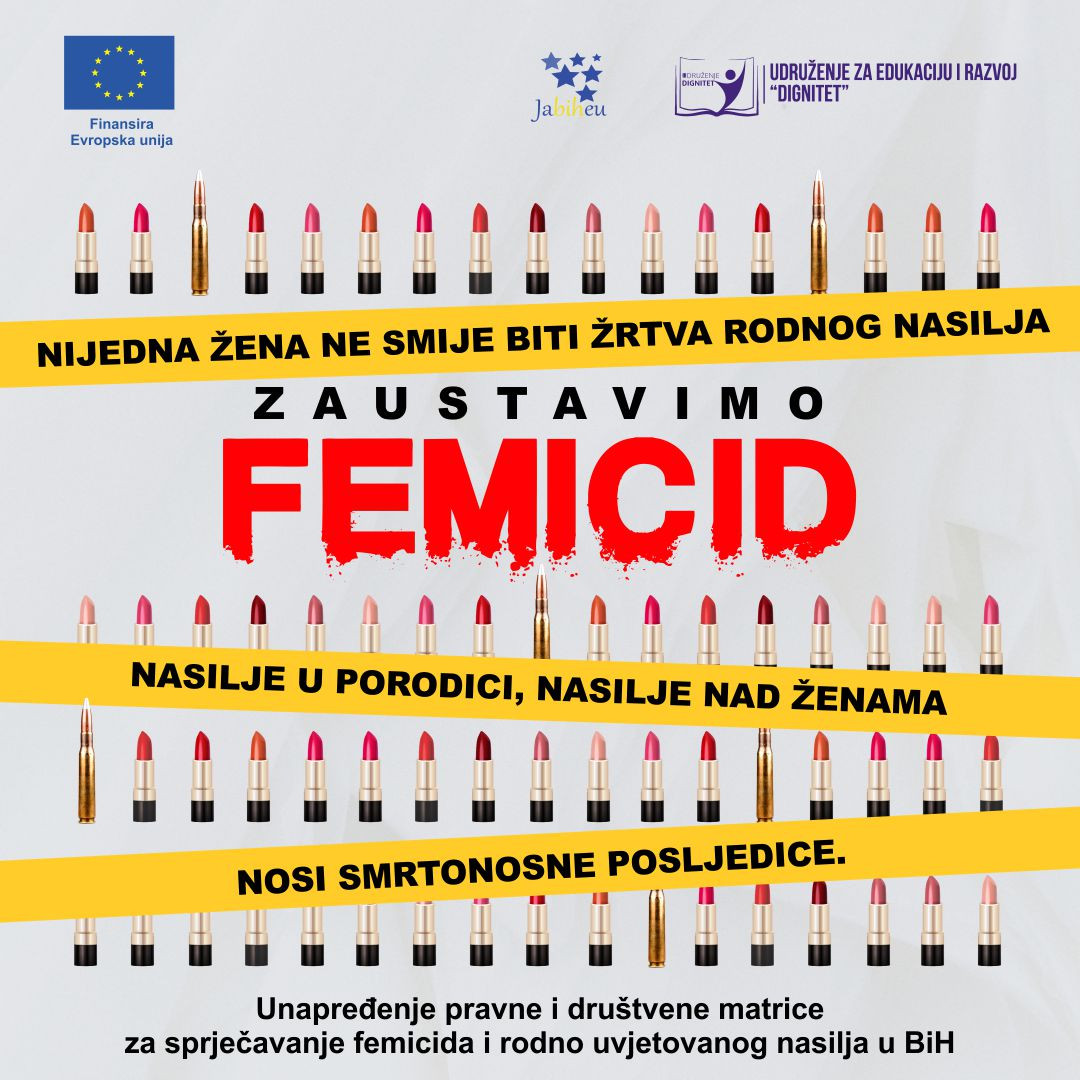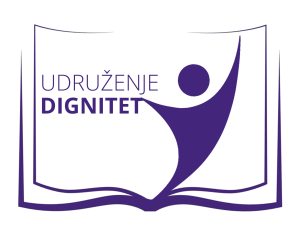TERMS OF REFERENCE
AN ASSOCIATION OF PROFESSIONALS CIVIL SOCIETY ORGANIZATION AND RESEARCHERS
CONTRACT NO: 2022/441-344
Advancing the Legal and Social Matrix to prevent Femicide
and Gender-based Violence in Bosnia and Herzegovina
CONTRACTING AUTHORITY
EUROPEAN COMMISSION
BACKGROUND
Violence against women in Bosnia and Herzegovina (BiH) is widespread, but often goes unnoticed until the final iteration – murder.
Although there are legal measures to deter and punish violence against women, experts warn that these are not adequate, a fact to which recent murders attest. In addition, femicide still lacks a universally agreed-upon definition, as well as recognition as a distinct criminal offence under BiH law.
Support services for victims of violence are largely gender-insensitive and thus fail to meet the specific needs of women who are physically and/or sexually abused. Furthermore, courtroom statistics show that male perpetrators of violence against women are often given conditional or inordinately low prison sentences and that enforcing female victims’ right to compensation for damages and costs incurred as a result of violence is still the exception rather than the rule.
The cultural matrix of violence and sexist attitudes are still deeply rooted in Bosnian society. It is easy to see that the causes of femicide should be sought in the position of women and gender roles, where two-thirds of people believe that violence against women by partners, acquaintances, or strangers is common and where the general opinion is that women should be subordinate to men. In addition to the general presence of stereotypes and prejudices, and attitudes about violence against women, the causes of femicide are often riddled with misconceptions. The most common misconception is that killing a woman happens suddenly in an extreme situation. It is also a misconception that women are killed only by dysfunctional men. BiH Agency for Gender Equality, collected data from judicial institutions and non-governmental organisations that stated a total of 56 women were killed in BiH in a relatively short period from 2015 to 2019, but these killings were not treated as femicide. Even 48% of women in BiH have experienced some form of violence: sexual harassment, stalking, violence by an intimate partner or non-partner from the age of 15 .
Bearing in mind the overall atmosphere in BiH, political, social and economic instability, inadequate media coverage as well as public misperception of femicide and overall, of gender-based violence, it is realistic to expect that these numbers may significantly increasing, as well as that women somehow provoked the perpetrator, and that they “deserved” that murder .
Overall objective of the project
The overall objective is to protect human rights and fundamental freedoms of women and girls and to challenge the cultural and social matrix of gender-based violence in BiH primarily by promoting elimination, prevention, and protection from femicide in support to Council of Europe Convention on preventing and combating violence against women and domestic violence (Istanbul Convention).
Specific Objectives
Specific objectives of this project are to advocate for improved legislation, referral mechanisms, and changing legal norms and practices in the treatment of femicide.
Scope of work
The Association for Education and Development “Dignitet” looking for an association of professionals (hereinafter: the association), civil society organization and researchers ro apply one or more lots for implementation of the activity: Drafting of Recommendations for amendments to criminal legislation with special reference to femicide (recognition, occurrence, definition), drafting of Guidelines for elimination, prevention and protection from femicide, preparation and maintenance of 6 online educational/coordination workshops.
The subject of procurement is divided into 3 LOTs:
LOT 1: Drafting of Recommendations for amendments to criminal legislation with special reference to
femicide (recognition, occurrence, definition),
LOT 2: Drafting of Guidelines for elimination, prevention and protection from femicide,
LOT 3: Preparation and maintenance of 6 online educational/coordination workshops.
LOT 1: Drafting of Recommendations for amendments to criminal legislation with special reference
to femicide (recognition, occurrence, definition),
Description of tasks
1. Actively and regularly participate in six (6) online meetings with the aim of drafting Recommendations for amendments to the criminal legislation with special reference to femicide (recognition, phenomenology, definition) within two months from the conclusion of the contract
2. Participate in the preparation of meetings and prepare the written contribution
3. Give a written review of each meeting as to include
– brief job description;
– meeting dynamics;
– reporting on assumed obligations;
– review of the conclusions of the held meeting;
4. Participation in formulating recommendations and provide comments to the draft versions
Recommendations will include units:
Introduction
First unit:
a) the definition of femicide as a gender-based murder of a woman;
b) etymology and phenomenology of femicide;
c) compliance of criminal legislation and public policy in Bosnia and Herzegovina and Herzegovina with the Council of Europe Convention on the prevention and fight against violence against women and domestic violence;
d) comparative analysis of the criminal legislation in the region and the EU with the criminal legislation of BiH when it comes to the concept of femicide,
Second unit:
e) the best module for intersectoral and interinstitutional data collection on femicide cases
f) analysis of existing mechanisms for collecting data on cases of domestic violence and violence against women,
g) existing intersectoral and interinstitutional cooperation in the field of data exchange,
h) analysis of BiH legislation on the prevention of domestic violence and the interaction of its provisions with the necessity of criminalizing “femicide”
Third unit:
h) recommended methods and channels of representation towards the competent authorities and the judiciary for changing the legal definition and court practice (analyze and explain what are the ways and channels through which it is possible to influence the competent authorities and the judiciary to support the initiative
Fourth unit:
i) Legislative framework for possession of small arms and light weapons in Bosnia and Herzegovina
Fifth Unit:
j) Recommendations for preventing femicide
k) Proposals to incite femicide as a special crime against life and limb or a special form of aggravated murder
Recommendations should be in Bosnian and English and contain a minimum of 15 pages.
LOT 2: Drafting of Guidelines for elimination, prevention and protection from femicide,
Description of tasks
1. Actively and regularly participate in six (6) online meetings with the aim of creating Guidelines for the elimination, prevention and protection from femicide within two months from the conclusion of the contract
2. Participate in the preparation of meetings, prepare the written contribution
3. Give a written review of each meeting as to include
– brief job description;
– meeting dynamics;
– reporting on assumed obligations;
– review of the conclusions of the held meeting;
4. Active participation in formulating Guidelines;
5. Submit a written document Guidelines;
– The guidelines should point out the observed shortcomings in the judicial practice so far (data on victims, previous violence, mitigating and aggravating circumstances, the amount of the sentence, the settlement of property-law claims in criminal proceedings, etc.) and how this issue can be better resolved through the existing legal system framework, by improving the behavior of practitioners,
– What is the potential for expanding the use of “referral mechanisms” to prevent “femicide”
– Proposal to solve the problem through existing offenses in combination with difficult circumstances inherent in cases of femicide.
The guidelines should be in Bosnian and English and contain a minimum of 15 pages.
LOT 3: Preparation and maintenance of 6 online educational/coordination workshops.
Description of tasks
1. Participation in meetings for the preparation of the workshop;
2. Holding a workshop lasting at least 3 hours;
3. Preparation of presentations;
4. Preparation of the agenda;
5. Submission of a report on the held workshop.
The content of the workshops will include the following topics:
a) Support for research and data collection on gender-based violence against women, including violence in the family and partner context,
b) Trafficking in women and femicide,
c) Establishing a connection between gender-based killings of women and various forms of violence against women,
d) Multisectoral cooperation in the field of prevention and fight against all forms of gender-based violence against women and provision of services to victims, including specialized services provided by civil society organizations,
e) Processing cases of attempted murder i
f) Methodology for continuous monitoring and evaluation of the efficiency and effectiveness of the work of all competent actors, with the active participation of women’s civil society organizations.
QUALIFICATIONS OF THE EXPERT AND ASSOCIATION/ORGANISATION
General professional experience of experts proposed by the association/organisation
• At least 5 years of experts’ experience in law practicing
• Experts’ experience in the court proccedings
• At least 5 years of work experience in the field of human rights
Experts Qualifications and skills:
• Bachelor degree
• Excellent knowledge of spoken and written English;
• Excellent written communication, interpersonal and organisational skills
• Willingness to teamwork and cooperation with all actors
• Knowledge on EU and CoE communication protocols would be an asset
Duration of Mission and Reporting:
Duration of the mission will be up to 2 months in total.
Selection criteria:
The organizations/associations are required to provide the CVs of their experts and organisation/association portofolio. The organisations/associations ‘ fee will be negotiated.
Open positions: 10
Work place:
Bosnia and Herzegovina
REPORTING
The organsations/associations shall draw up reports and documents in accordance with the scope of the ToR. All reports shall be elaborated in Bosnian and English languages.
Note: All the documents produced must satisfy European Union visibility requirements including European Union logo, information on funding as well as disclaimer.
DEADLINE
The Applicants shall deliver their documents to email info@dignitet.ba, until 08.08.2023.













